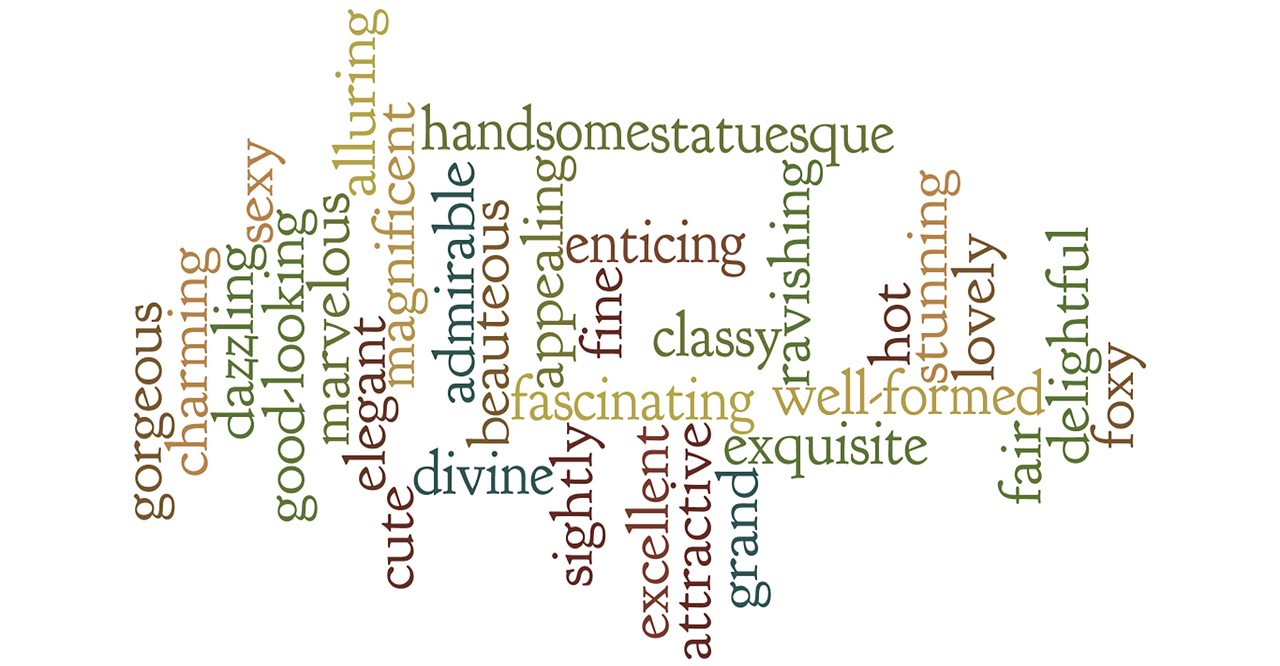覚えていますか?
「絶対におさえたい 連続する形容詞を並べるルール」でマスターした英語形容詞の並べ方。
英語で名詞を修飾する際、「順番や数」、「評価」、「大きさや長さ」、「形」…のように、階層のようにその順番が明確に決まっており、それを間違えてしまうと英語ネイティブスピーカーには不自然に聞こえる、というお話をしました。
そのような名詞群を日本語では「累積形容詞群」、英語ではCumulative adjectivesと呼びます。
では、「昨日、美しく、聡明な女性に会いました。」のように、同じ階層(評価)にある形容詞を2つ並べる場合はどうするのでしょう?
さて、今日も3分で英語ブログを流し読み。答えはブログの中に。
If you read our post How to Put Cumulative Adjectives in Order, you hopefully learned a few things, such as:
- Cumulative adjectives follow a specific order.
- If they’re out of sequence, they sound incorrect.
- They aren’t separated by commas.
That’s all useful info, but what if we told you that there’s another kind of adjective? They’re called coordinate adjectives.
In this post, we’re going to discuss the differences between cumulative and coordinate adjectives.
Read on!
Cumulative adjectives
As we mentioned above, cumulative adjectives must go in a specific order and they build on one another. That means that each adjective is placed before or after the others depending on its type. These adjectives work together—not separately—to describe a noun.
Imagine you want to describe your friend. She’s a student at university and she’s intelligent. Before you can put the adjectives in order, you need to figure out which categories these adjectives fall into (check here if you don’t remember):
- Intelligent = opinion
- University = type
According to the adjective order rules, you should say: She’s an intelligent university student. This is because “opinion” adjectives come before “type” adjectives.
→ This sentence means that your friend is a university student who is intelligent.
You can’t say: She’s a university intelligent student. The adjectives are in the wrong order—you can’t use “university” to modify “intelligent.”
→ In this order, the sentence means that she’s an intelligent student who is university. This makes no sense!
Coordinate adjectives
Coordinate adjectives are different from cumulative ones because they all modify a noun equally and separately. None are more important than the others and they have no specific order.
Look at these three adjectives: comfortable, luxurious, peaceful. They’re all from the “opinion” category of adjectives, so they all have the same importance.
Imagine you’re describing the noun “hotel.” You could say:
→ I stayed at a comfortable, luxurious, peaceful hotel.
. . . but you could also say:
→ I stayed at a luxurious, peaceful, comfortable hotel.
. . . or even:
→ I stayed at a peaceful, comfortable, luxurious hotel.
The comma tests
You may have noticed something above:
- Cumulative adjectives don’t take commas.
- Coordinate adjectives do take commas.
If you’re trying to figure out if you should be using commas, but you’re not sure if the adjectives are cumulative or coordinate, try these two tests:
- Test 1: Add “and” between the adjectives.
- Test 2: Change the order of the adjectives.
If you do these tests and the meaning of your phrase changes or it sounds wrong, you’ve got cumulative adjectives. Here, you should not use commas.
If your phrase still sounds fine and makes sense after you do these tests, you have coordinate adjectives. In this case, you should add commas.
Let’s look at an example and try out the tests:
→ We watched the beautiful summer sunset at the beach.
- Test 1: We watched the beautiful and summer sunset at the beach. (Incorrect)
- Test 2: We watched the summer, beautiful sunset at the beach. (Incorrect)
These adjectives need to be in a specific order and they have to function together to describe the noun; they can’t do this individually. Here, “beautiful” is modifying both “summer” and “sunset”; it has to come first. These are cumulative adjectives.
Let’s try another one:
→ I love the cool, refreshing winter days.
- Test 1: I love the cool and refreshing winter days. (Correct)
- Test 2: I love the refreshing, cool winter days. (Correct)
In this case, both tests work: You can change the order of the adjectives and add “and” between them, and the meaning stays the same. This means these are coordinate adjectives.
Conclusion
Using cumulative and coordinate adjectives correctly isn’t always simple. But soon enough, it’ll come more naturally. Until then, refer to these tips when you’re feeling stuck . . . and keep trying!
いかがでしたか?
同じ階層(評価)にある形容詞群を、coordinate adjectives(等位形容詞群)と呼びます。
「昨日、美しく、聡明な女性に会いました。」は、
I met a beautiful and intelligent woman yesterday.
I met a beautiful, intelligent woman yesterday.
I met an intelligent and beautiful woman yesterday.
I met an intelligent, beautiful woman yesterday.
上の4パターン全て正解、ということになりますね!




